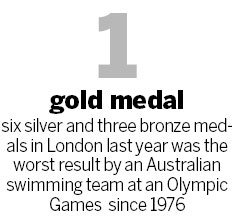Magnussen: Sleeping pills a tradition
World 100m freestyle champion James Magnussen - who led the much-vaunted 4x100m Australian relay team which bombed spectacularly at the 2012 Olympics - has claimed taking sleeping tablets was "a tradition".
The team last week admitted taking the prescription drug Stilnox, banned by the Australian Olympic Committee, as part of a "bonding exercise" ahead of the Games in London, where it failed even to reach the podium.
Five of the six team members took one of the sleeping tablets at a staging camp in Manchester after seeing a movie and going to dinner in a bid to build unity in the fiercely competitive team.
In an interview with Channel Seven aired late on Sunday, Magnussen said during dinner the discussion had turned to what previous relay teams had done to bond and the group had collectively decided to take the drug.
"The tradition had been, and what we did, was take Stilnox on its own with water," he said.

"We then sat around telling jokes, you know laughing, carrying on. It was really, I think, for a lot of us a chance to take a step back from the pressure."
Australian swimmers had previously used Stilnox to ensure a good night's rest before competition until the AOC banned it in the lead-up to London.
But use of the drug had been discouraged as far back as 2005, according to The Australian newspaper, which said former relay swimmers Michael Klim, Ashley Callus and Andrew Lauterstein had all denied taking it as a bonding tradition.
Recreational users of Stilnox often deliberately try to stay awake, which can induce a "high" and even cause hallucinations.
Magnussen, 21, denied he was out of control on the night when the team engaged in misbehavior including door-knocking and prank-calling teammates, but said he would not be repeating the actions.
The swimmer said he had learned "a lot about the repercussions of my behavior" and admitted to being too arrogant before the Games.
London was Australian swimming's first Games without an individual gold medal since the 1976 Montreal Olympics and marked Australia's lowest medal haul in the sport since Barcelona in 1992 with just one gold, six silver and three bronze medals.
(China Daily 02/26/2013 page23)


















